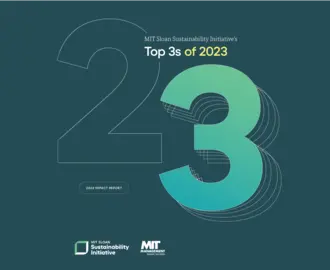MIT Sloan Sustainability Initiative
Sustainability
A conversation with Deloitte & Touche LLP Managing Director Jonathan Schuldenfrei
In preparation for this year's MIT Sustainability Summit "De-mystifying Carbon Markets", student organizers sat down with Jonathan Schuldenfrei, Deloitte & Touche LLP Managing Director, panelist for the session "Enforcing Demand."
Register for the summit today!
Jonathan, could you start by telling us a little about your career journey, how you found yourself in a role that is focused on sustainability, and what value does that drive for you in your own career development?
I have a background in decision science which requires the quantification of non-financial benefits, along with financial benefits. A lot of those non-financial factors happened to be ESG elements and by creating methodologies, developing frameworks, using analogs, identifying information, and leveraging a data-driven approach to make more informed decisions, I got heavily involved with sustainability and climate equity.
My journey at Deloitte started out in a very quantitative finance group and I was eventually selected by Deloitte Canada to help build the business in this space. I worked in the Canadian practice for almost five years where I developed a market, team, and service line from zero to millions. I've since handed that off to a series of partners and directors.
Additionally, I'm also passionate about living a purpose-driven life and, as a finance guy, being able to combine that passion with where I can also help organizations is a critical part of my career. Making a positive impact in this world is extremely important to me. I think that's what keeps me at Deloitte and in this space. Today, I've been recruited back by Deloitte US to its Sustainability, Climate & Equity practice where I draw on my decision science background and passion about the topic of living a purpose-driven life.
With that in mind, how does your background translate to your current role at Deloitte? What are some of the challenges you are currently helping clients tackle?
I'd say I'm focusing on three areas. I'm helping clients navigate a low-carbon economy as well as helping them realize the benefits of carbon as an asset. Third, is helping clients with their climate adaptation strategies as a result of physical risk becoming more and more prevalent.
In terms of carbon as an asset, we're currently working on strategies and mechanisms to help clients monetize carbon reduction activities in the form of price premiums as bolt-ons to their everyday products. When helping clients navigate a low carbon economy, it's really about identifying and structuring the return on investment as it pertains to value creation in their business.
I have one client that is looking to develop more market share because they do not require cold chain in their product and many of their competitors do. So, their emissions footprint is lower and they want to make the claim that they are the green alternative in the marketplace. I also recently worked with a company around navigating the risks and opportunities that occur based on the toggle between transition risk and physical risk. Another client is working with its suppliers on their value chain as they contribute to the scope three emissions and what they can do in order to positively influence their carbon footprint.
Building on that, how do you envision the future of voluntary markets – from a customer lens, a regulatory lens?
What I'm currently observing in this market is that there's a supply and demand issue that needs to be resolved before the voluntary markets take real hold. And what I mean by that is that is many of the clients that I work with want to monetize their carbon avoidance or their carbon reduction opportunities rather than manage hard to abate areas through voluntary markets.
What does that mean? Essentially that means that they want to figure out how to monetize premiums in their value chain based on the decarbonization activities that they want to engage in.
They are asking, what is the baseline today? How, how can that change be additional? How can it be permanent? How can it follow the principles of a methodology that qualify it as a monetizable activity? So, I think that the market is really going to be one of an inset strategy and internal to organizations along its value rather than start in the offset market once that those activities are saturated, because there's only so much tolerance a community will have to price increases based on their perception of value. That's when the offset market is going to explode because there will be an enormous amount of decarbonization activities that clients will engage in, and they will want to monetize it in whatever vehicles exists.
Additionally, there are series of other co-benefits that are attached to nature-based projects that may not necessarily be applicable for everyone. And therefore, there's a segmentation in the marketplace where there are these highly, negotiated instruments to understand and structure the exchange between a buyer and a seller. There might be ancillary benefits that they are seeking to capture outside of just carbon management.
What advice do you give to companies as they start to think about this transition, or if there are other elements they ought to consider from a compliance market perspective as well?
My view on that is really around how companies can manage stranded assets at the end of the day. What is really going to drive business is to avoid their assets being stranded either from the pace of technological change, customer preference, or regulatory requirements. Being knowledgeable about those trends so that they can manage their existing portfolio base such that the portfolio base will not be stranded and that they are keeping up with the pace of change is the competitive advantage and the differentiator that most companies should seek in order to move toward.
If you look at types of transformation, like the industrial age, like the digital age, the internet age – there is a disruptor. There are defined and clear forces that can lead to the likelihood of an asset being stranded and therefore being apprised, knowledgeable, and agile to those factors is going to be critical.
We'll close here on what are you most excited about for the 2023 MIT Sustainability Summit and what are you most looking forward to?
I think meeting next gen leaders and understanding what they care about. I love passion. I love smart people who pursue their passion, and I'm really excited to connect with all the enthusiastic individuals that are working to change this world in a positive way.



